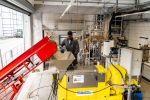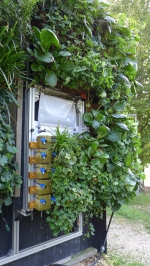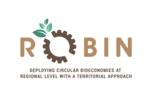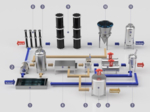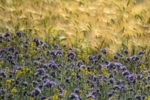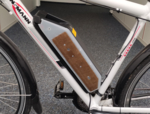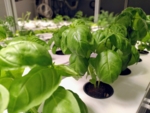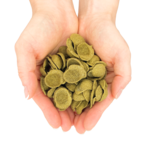-
-
-
Sustainable binder alternative - 18/12/2023
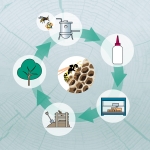
Plastic is all around us; and unfortunately, it is not going away any time soon. The search for more sustainable solutions is fully underway. However, binders that degrade only with difficulty or not at all are still used to bond natural materials such as wood and straw - not yet truly environmentally friendly. Fraunhofer researchers are working on an insect-inspired wood binder that makes bonded wood products both resistant and biodegradable.
https://www.biooekonomie-bw.de/en/articles/news/copied-insects-new-biological-wood-binder-under-development
-
urban BioEconomyLab - 07/12/2023
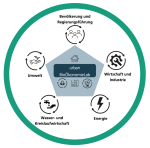
Baden-Württemberg is leading the way in the transition to a climate-neutral and sustainable economy. One of the projects undertaken is the Fraunhofer IGB’s "urban BioEconomyLab" project which aims to develop a transformation model and living laboratory to find bioeconomic solutions for the sustainable design of cities and municipal industry. What is new is that the IGB takes a systemic approach, focusing on biobased and circular value…
https://www.biooekonomie-bw.de/en/articles/news/city-living-laboratory-bioeconomic-sustainable-economic-area
-
The AlbLavendel project - 20/11/2023

Blue-violet, fragrant fields like those in Provence may soon become a common sight in the Swabian Alb. As part of the AlbLavendel project, the University of Hohenheim along with the company naturamus GmbH and the German Institutes of Textile and Fibre Research Denkendorf has started to investigate the cultivation of lavender, the production of essential oils and the use of distillation residues for producing textile fibres in the local region.
https://www.biooekonomie-bw.de/en/articles/news/swabian-lavender-cultivation-aesthetic-and-sustainable
-
Press release - 02/11/2023
The Sustainability Innovation Campus (ICN) initiated by the University of Freiburg and the Karlsruhe Institute of Technology (KIT), which will begin its work in January 2024, has announced a two-year funding programme for start-up projects. Scientists from the University of Freiburg, KIT and cooperating universities and research institutions are invited to submit their project outlines by 30 November 2023.
https://www.biooekonomie-bw.de/en/articles/pm/sustainability-innovation-campus
-
-
-
Food of the future: new production methods - 06/09/2023
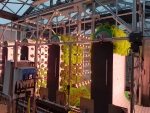
A rapidly growing world population and simultaneously rapidly shrinking arable land – these are just some of the major challenges facing the food industry. But how can solutions be found? Answers are being sought by the bioeconomy innovation space NewFoodSystems. Funded by the German Federal Ministry of Education and Research (BMBF), it is a network where science and industry can come together to develop sustainable food systems of the future.
https://www.biooekonomie-bw.de/en/articles/news/newfoodsystems-innovation-space-tomorrows-food
-
-
-
-
-
Valorization of biological materials - 12/01/2023
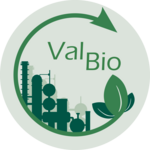
Reducing carbon dioxide emissions and the capture and utilization of CO2 are important steps towards achieving a climate-neutral and sustainable economy. Accordingly, as part of the ValBio-Urban research project, an interdisciplinary team from the University of Stuttgart is developing bioeconomic approaches to solutions that will be implemented with companies from Baden-Württemberg.
https://www.biooekonomie-bw.de/en/articles/news/valbio-urban-brings-bioeconomy-research-users
-
-
-
-
-
-
Sustainable nutrition - 05/09/2022
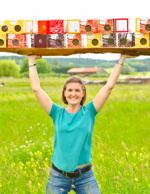
Insects on the dinner plate? Some people instantly dismiss the idea. Wrongly so, because in terms of animal welfare, ecological footprint and healthy nutrition, insect foods are much better than all other animal foods and are produced in a more controlled way. The fact that they can also taste really good is proven by the start-up Beneto Foods from Albstadt, which has developed protein-rich pasta in various flavours using cricket flour.
https://www.biooekonomie-bw.de/en/articles/news/insect-pasta-eating-healthily-and-improving-world-same-time
-
Project BW2Pro - 29/08/2022
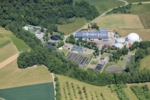
In 2020, Germany’s population collected over 5 million tonnes of biowaste. Most of this was composted, and some was fermented into biogas. Scientists in Baden-Württemberg think there's room for more. Within the project ‘Biowaste to Products’ (BW2Pro) they want to transform biowaste into new products in a biorefinery. The idea is to produce biodegradable plant pots, mulch material, fertilisers, enzymes and biobased plastics in addition to…
https://www.biooekonomie-bw.de/en/articles/news/biowaste-products-biorefinery-transforms-biowaste-new-products
-
-
Lentil cultivation in a producers’ association - EIP-AGRI Rhizo-Linse project - 23/05/2022
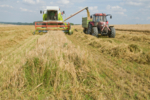
Complicated cultivation, fluctuating yields and complex cleaning: Leisa – as lentils are called in Swabian – are demanding. So to produce lentils economically, 130 farmers in the Swabian Alb have joined forces and set up the organic producers’ association Alb-Leisa. Their lentil harvests are processed and marketed by a company called Lauteracher Alb-Feld-Früchte.
https://www.biooekonomie-bw.de/en/articles/news/cultivation-market-lentils-swabian-alb
-
Lentil cleaning - EIP-AGRI Rhizo-Linse project - 26/04/2022
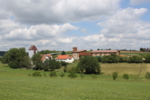
The Altdorf mill, just under 7 km south of the city of Böblingen, has operated lentil cleaning facilities since 2019, the year that the Sessler mill in Renningen, 20 km further north, ceased all operations including lentil cleaning. After receiving a number of enquiries from farmers and local mills, brothers Karl and Jörg Ruthardt took a chance and launched a lentil cleaning operation in addition to their mill and farm shop business.
https://www.biooekonomie-bw.de/en/articles/news/lentil-cleaning-altdorf-mill
-
Press release - 06/04/2022
The University of Stuttgart is contributing to innovations for climate protection as part of the EU project "Smart Circular Bridge". An old material is being rediscovered: flax has been with us for thousands of years in the form of clothing, sacks, and robust ship's ropes. Now the plant fibres are experiencing a renaissance and could become the building material of the future.
https://www.biooekonomie-bw.de/en/articles/pm/high-tech-bruecke-mit-flachs-gebaut
-
-
Lentil cultivation and cleaning on the farm - EIP-AGRI Rhizo-Linse project - 16/03/2022
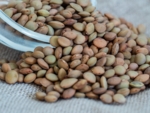
Lentils are among the oldest crop plants in Central European agriculture and were once a popular food in ancient Egypt, Persia and Mesopotamia. The legume was widespread in Germany until the mid-20th century, but has since disappeared completely from farmers’ fields. Over the past decade, lentils have reappeared as a crop grown locally and are cultivated in harmony with nature.
https://www.biooekonomie-bw.de/en/articles/news/lentils-return-heckengaeu-region
-
Press release - 02/03/2022
The Ministry of the Environment, Climate Protection and the Energy Sector is funding the KoalAplan project, which extends the functional scope of a wastewater treatment plant. The project, based in the Stuttgart district of Büsnau, aims at recovering raw materials from wastewater and is therefore making a positive contribution to climate neutrality, as the products obtained replace fossil raw materials and energy-intensive processes.
https://www.biooekonomie-bw.de/en/articles/pm/biorefinery-project-koalaplan-extracting-raw-materials-wastewater
-
Press release - 02/03/2022
The Ministry for the Environment, Climate Protection and the Energy Sector is funding the new research project RoKKa which is used to prove the viability of recovering raw materials from wastewater. This adds a crucial function to the scope of a conventional sewage treatment plant. Together with the operators of the sewage treatment plants in Erbach and Neu-Ulm, the project partners demonstrate the positive contribution towards climate protection…
https://www.biooekonomie-bw.de/en/articles/pm/die-klaeranlage-der-zukunft-heisst-bioraffinerie
-
-
Press release - 02/02/2022
fischertechnik has set a new milestone with the Animal Friends construction kit, as the building blocks and packaging are largely made of renewable resources and the models depict playful animals in new colours. The company is thereby taking another major step towards sustainability. The bio-based building set recently won the Toy Award, one of the most prestigious awards in the industry.
https://www.biooekonomie-bw.de/en/articles/pm/animal-friends-aus-nachwachsenden-rohstoffen
-
-
Press release - 13/01/2022
Making important raw materials for fine chemicals out of carbon dioxide really works. As part of the Max Planck collaborative project eBioCO2n, a team of researchers from Fraunhofer IGB have successfully performed a first ever fixation of CO2 via a multi-enzyme enzyme reaction driven by electricity yielding a prospective intermediate for the chemical industry. The process for electro-biocatalytic CO2 fixation was recently published and is…
https://www.biooekonomie-bw.de/en/articles/pm/turning-harmful-co2-useful-chemicals
-
Press release - 12/01/2022
Chitin is the main component of insect carapaces and ensures that they are both stable and flexible. The Chitinfluid research project, funded by the Carl Zeiss Foundation, focuses on the use of chitin in construction and aims to process chitin and its derivatives into sustainable materials. In a hybrid symposium under the auspices of Prof. Sabine Laschat from the University of Stuttgart, the project team discussed the current state of research…
https://www.biooekonomie-bw.de/en/articles/pm/insect-carapace-sustainable-building-material
-
-
-
Dossier - 17/11/2021
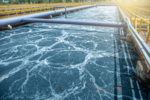
Sustainability is in vogue. And it’s not a question of wanting to be sustainable, but having to be: as the latest report from the Intergovernmental Panel on Climate Change shows, protecting the climate and the environment calls for swift action. Biorefineries that use renewable raw materials and recycle industrial raw materials are playing an important role in the bioeconomy concepts of many countries - including the state of Baden-Württemberg.
https://www.biooekonomie-bw.de/en/articles/dossiers/biorefinery-new-paths-build-our-tomorrow
-
-
Compostable nappies - 14/10/2021

In an EU-funded project, the Tübingen-based biotech company Novis is working with international partners to develop a fully compostable nappy that contains no plastic parts. This could reduce the huge quantities of used disposable nappies that have been produced to date and the enormous costs of disposal, as well as avoiding the greenhouse gases produced when they are incinerated.
https://www.biooekonomie-bw.de/en/articles/news/nappies-sustainable-bioeconomy
-
-
Start-up PROSERVATION - sustainable packaging - 21/09/2021
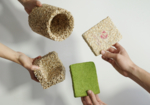
Expanded polystyrene (EPS) packaging is very practical, but it is made from petroleum and is not very environmentally friendly in other ways either. Single-use plastic containers made of EPS have therefore been banned in the EU, but alternatives are also urgently needed. The Stuttgart-based start-up PROSERVATION has developed an ecological packaging material made from grain husks that could replace EPS and be just as effective.
https://www.biooekonomie-bw.de/en/articles/news/husk-substitute-polystyrene-packaging-materials-good-conscience
-
-
Reduction of greenhouse gases in wine production - 31/08/2021

In the EU project REDWine, the CO2 produced during wine fermentation is captured and used to produce algae biomass. Novis GmbH from Tübingen supplies the complete system for CO2 utilisation. The aim of the project is to reduce the share of global warming caused by wine production in a way that is economical for producers.
https://www.biooekonomie-bw.de/en/articles/news/redwine-project-and-climate-change
-
Press release - 30/08/2021
In August 2021, the BioMat Pavilion 2021 was inaugurated on the campus of the University of Stuttgart in a ceremonial setting and in compliance with the hygiene concept. The core of the elegantly curved lightweight construction is an active-bending structure made of natural fibers, reminiscent of bamboo. It was developed as part of the "LeichtPRO" research project.
https://www.biooekonomie-bw.de/en/articles/pm/biegsam-wie-bambus-belastbar-und-leicht
-
-
Plastics from the field - 12/08/2021
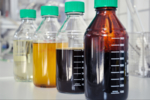
Huge amounts of waste are produced both during food production and by consumers. The Conversion Technologies of Biobased Resources group at the University of Hohenheim’s Institute of Agricultural Engineering has developed a process to convert this biomass into hydroxymethylfurfural (HMF), the highly potent basic chemical that is used to produce plastics.
https://www.biooekonomie-bw.de/en/articles/news/great-potential-biological-residues
-
-
Press release - 02/08/2021
Carbon dioxide is one of the main drivers of climate change – which means that we need to reduce CO2 emissions in the future. Fraunhofer researchers are highlighting a possible way to lower these emissions: They use the greenhouse gas as a raw material, for instance to produce plastics. To do this, they first produce methanol and formic acid from CO2, which they convert via microorganisms into building blocks for polymers and the like.
https://www.biooekonomie-bw.de/en/articles/pm/co2-raw-material-plastics-and-other-products
-
Press release - 27/07/2021
The Hallertau is Germany's largest hop-growing region. During harvesting, hop bine chaff is left over, which is converted into environmentally friendly bio natural gas on site in a biogas plant. But that is not the end of the utilization chain for this fiber plant. Researchers at the German Institutes of Textile and Fiber Research Denkendorf (DITF) have used the plant-containing biogas digestate to produce a composite material that can be…
https://www.biooekonomie-bw.de/en/articles/pm/furniture-biogas-plant
-
Alpha-Protein GmbH - 27/07/2021
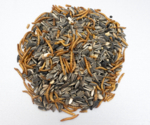
Mealworms instead of fish meal and soybean meal - this is what the sustainable future of feed production looks like as Alpha-Protein GmbH see it. The company has built a highly efficient automated production plant in which residual materials from local food production are used to breed mealworms.
https://www.biooekonomie-bw.de/en/articles/news/insect-farming-sustainability
-
Press release - 09/07/2021
Refuels are renewable fuels that can be produced in different ways. When they are mixed and processed such that they meet the existing fuel standards, they are suited for all types of combustion engines. This is the result of the latest vehicle and fleet tests within the project “reFuels – Rethinking Fuels” at Karlsruhe Institute of Technology (KIT). Compared to fully fossil fuels, refuel mixes allow for a CO2 reduction by 25% at least. Moreover,…
https://www.biooekonomie-bw.de/en/articles/pm/refuels-are-suited-wide-use
-
-
Start-up kernique catch the zeitgeist - 29/06/2021
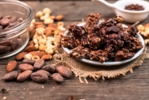
A delicious vegan nut snack that uses no sugar, artificial additives, gluten or palm oil, is full of essential nutrients, and is part of a commitment to environmental and social sustainability. Impossible? An Esslingen-based start-up called kernique proves otherwise. The start-up is currently planning a crowdfunding phase that offers a lucrative deal for investors. The idea catches the zeitgeist, but what exactly makes it stand out?
https://www.biooekonomie-bw.de/en/articles/news/nut-snack-sustainable-ecological-concept
-
-
Press release - 15/06/2021
Microorganisms are the oldest, most abundant, and most diverse life forms on earth and offer enormous potential for biotechnological applications. To date, however, only a fraction of them could be isolated and cultivated. The “MicroMATRIX” research project, funded with € 1.5 million by the German Federal Ministry of Education and Research and led by Karlsruhe Institute of Technology (KIT), aims to shed more light on the microbial darkness.
https://www.biooekonomie-bw.de/en/articles/pm/biooekonomie-von-der-wg-ins-mikroben-eigenheim
-
-
-
Press release - 27/05/2021
The pulp of coffee beans is considered a waste product on coffee plantations, which is usually thrown away or dumped into rivers - with significant negative consequences for climate change and the environment. Macarena San Martín-Ruiz from the University of Stuttgart is working with Coopetarrazú, the largest coffee cooperative in Costa Rica, to find out how the mixture of pulp and husks can be turned into organic compost and thus protect the…
https://www.biooekonomie-bw.de/en/articles/pm/coffee-s-pulp-waste-becomes-organic-compost
-
Press release - 18/05/2021
The Bio-based Industries Joint Undertaking (BBI JU) has signed the grant agreements with 18 new projects, selected for funding under the 2020 Call for proposals. 199 beneficiaries from 26 countries across the EU and beyond will receive BBI JU’s financial support worth €104.5 million. This is the seventh and last BBI JU call which will bring the total investment of the initiative to €821.6 million and the BBI JU’s portfolio to 142 projects.
https://www.biooekonomie-bw.de/en/articles/pm/bbi-ju-invest-eur1045-million-circular-bio-based-projects
-
Press release - 03/05/2021
The amount of plastic waste increases every year. Some of this waste is due to plastic packaging used to protect food. As part of the “BioActiveMaterials” project, researchers at the Fraunhofer-Gesellschaft have developed an eco-friendly coating for paper packaging. With this, not only is plastic saved, but the coating of plant-based proteins and waxes also extends the shelf life of the food.
https://www.biooekonomie-bw.de/en/articles/pm/bioactive-paper-coatings-replace-plastic-packaging-foods
-
-
-
-
Press release - 20/04/2021
Protecting the global climate is an undertaking that presents both industry and society with a major task. It will not be possible to achieve the climate targets simply by limiting global emissions, by saving carbon dioxide (CO2). This is because there will continue to be unavoidable CO2 emissions that will nevertheless have to be compensated.
https://www.biooekonomie-bw.de/en/articles/pm/cellulosefasern-gegen-den-klimawandel
-
-
-
-
Paper technology - 10/03/2021
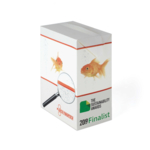
Plastic is indispensable: it is cheap and practical and found in many disposable products such as drinking straws, disposable tableware or even packaging like bonded beverage cartons or bags – and it has a disastrous effect on the environment. The start-up company Plafco Fibertech Oy has developed a sustainable plastic substitute made of paper that could replace many disposable plastic products in the future.
https://www.biooekonomie-bw.de/en/articles/news/plafco-sustainable-plastic-substitute-made-paper
-
-
Press release - 23/02/2021
The European Commission agreed on the successor of BBI JU – the Circular Bio-based Europe Joint Undertaking (CBE JU) in a legislative proposal adopted today. The new partnership between the EU and the Bio-based Industries Consortium (BIC) is expected to build on the success of BBI JU while stepping up its contribution to the EU’s climate targets, in line with the European Green Deal. The European Parliament and Council will now study the…
https://www.biooekonomie-bw.de/en/articles/pm/commission-gives-green-light-successor-bbi-ju
-
-
-
-
Press release - 26/01/2021
The University of Warmia and Mazury in Olsztyn, Polish partner of the BalticBiomass4Value project, published a report which maps biomass value chains for improved sustainable energy use in the Baltic Sea Region countries. The research focuses on the 9 Baltic Sea Region (BSR) countries: Denmark, Germany, Estonia, Finland, Latvia, Lithuania, Poland, Sweden, and Norway.
https://www.biooekonomie-bw.de/en/articles/pm/report-mapping-biomass-value-chains-improved-sustainable-energy-use-baltic-sea-region-countries-published
-
Paper production from plant fibres - 20/01/2021

Many consumers don't care about exactly how their paper packaging is made and what it is made of as long as it is "eco". But even producing recycled paper, trees need to be felled. An alternative could be paper made from cup plant. Together with partners, a company called Silphie Paper has developed concept for obtaining fibres for a new type of grass paper, while also producing heat, energy and nutrients for natural fertilisers.
https://www.biooekonomie-bw.de/en/articles/news/one-cycle-ecopaper-energy-and-fertiliser-made-silphium-perfoliatum
Website address: https://www.biooekonomie-bw.de/en/search
